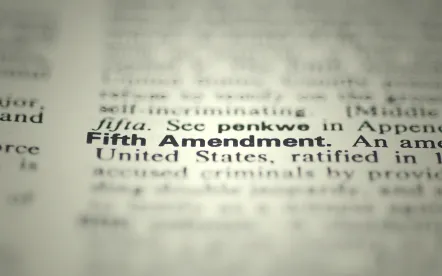Written by Paul Desmond in the key of E-flat minor and performed by the Dave Brubeck Quartet using a funky quintuple (5/4) time, “Take Five” is and was the biggest selling jazz single of all time. But it is also slang for exercising one’s Fifth Amendment privilege against self-incrimination. Because many civil lawyers ask when and how to invoke the privilege, we thought we would take a stab at answering some of the not-so-obvious questions that often arise.
How do I know when my client can take five?
Technically, when you or your client “reasonably believes” the disclosure “could be used in a criminal prosecution or could lead to other evidence that might be so used.” The critical words here are “reasonably” and “lead to.” Disclosures that would be of no use to, or could not be used by, prosecutors (e.g., statute of limitations) may not be shielded by the Fifth Amendment. However, any link in the chain to potentially incriminating evidence qualifies so any doubts should certainly be resolved in favor of invoking.
Does my client actually have to be guilty of the conduct at issue?
No, the privilege serves to protect the innocent who otherwise might be ensnared by ambiguous circumstances.
Can my client take five outside of a court proceeding?
Yes, your client can assert it in any proceeding where testimony is compelled, such as administrative, regulatory, and investigatory proceedings (including in a grand jury).
Can the fact that my client took five be raised in any of these proceedings, i.e. be used against her in any way?
Maybe. In federal civil proceedings (and in some States), a party can use an “adverse inference” against a client invoking their Fifth Amendment privilege. An adverse inference is never permissible, however, in a criminal case – the government may not even mention that a defendant invoked the Fifth Amendment in front of the fact-finder.
Is there any way around the adverse inference in civil proceedings?
Possibly. Where an adverse inference is allowed, courts often (but not always) stay civil cases until the parallel criminal investigation or case is concluded.[1] Alternatively, you might consider asking the court to issue a protective order prohibiting the use of your client’s responses in any future criminal proceedings.[2] The use of a protective order is risky because some courts have held that protective orders do not preclude evidence from being produced in response to a grand jury subpoena.
My opposing party took the fifth. May I rely solely on the adverse inference to prove my case?
No, in Lefkowitz v. Cunningham[3], the Supreme Court declined to allow an adverse inference where the only evidence adduced was the adverse inference. You must have some evidence to prove your case. The adverse inference merely bolsters that evidence.
My client received a subpoena for records. Can she take five?
Is your client an individual or a business entity? If your client is an individual, yes, generally. But, if your client is a business entity, probably not. The Fifth Amendment protects an individual from being compelled to self-select or produce documents if, in doing so, the witness’s mental processes would be revealed and incrimination might result. The act of producing not only authenticates the document, but also establishes its existence, the witnesses’ possession and the belief that the document is responsive to a request. Even if the document is located at the business, the document might still be personal to an employee of the business thereby shielding production; this is especially true when it is a sole proprietorship. Courts typically look at the totality of the circumstances in making that call.
My client received a discovery request in a civil proceeding. Can she take five?
Yes, the same reasoning highlighted above applies. The Fifth Amendment protects your client from being forced to self-select or produce documents if, in doing so, your client’s mental processes would be revealed and incrimination might result or whenever your client’s answer might tend to incriminate him/her. Note that a blanket assertion (i.e., refusing to answer all interrogatories even if an answer to several of the interrogatories would not tend to incriminate your client) is not proper.
Can my client take five when filing an answer to a civil lawsuit?
Yes, the privilege against self-incrimination protects your client from answering specific allegations in a complaint or petition if the answers would violate her rights under the privilege. But a proper invocation of the privilege does not excuse your client from the requirement to file a responsive pleading; your client must answer those allegations that can be answered and make a claim of privilege as to the rest so that the suit can move forward.
Can my client waive her right to take five?
This is a very thorny topic. Waiver of the Fifth Amendment privilege is strongly disfavored and “should be inferred only in the most compelling of circumstances.”[4] “Courts indulge every reasonable presumption against waiver of fundamental constitutional rights.”[5] However, if your client fails to take five in responding to questions to which she could have claimed the privilege, she may be deemed to have waived her privilege with respect to all questions on the same topic. This principle applies to testimony, discovery responses, and answers. While a waiver may be costly to your client, it is limited to the proceeding in which the waiver was made. Keep in mind though that a person can easily further incriminate themselves on a topic already testified to. For example, as the 9th Circuit previously held: “The question of waiver as to details is irrelevant when the additional details sought might further incriminate.”[6] In such a case, “an ordinary witness may pick the point beyond which he will not go, and refuse to answer any questions about a matter already discussed, even if the facts already revealed are incriminating.” [7]. Also, circumstances change all the time so that a person might be able to change their mind. When in doubt, invoke!
Can my client answer some questions but take five as to others?
Yes, your client can answer questions about topics that are not incriminating without waiving her right to take five on incriminating topics. Be careful though. What you might consider to be unrelated to an incriminating topic might be different than what a judge would consider to be related. Subject matter waiver could result, as discussed above.
Can my client ever be sanctioned for taking five in a civil, administrative, or regulatory proceeding?
No, the privilege trumps everything, so no tribunal is empowered to strike pleadings, enter a default judgment, hold the defendant in contempt, or the like.
Can my client retract the fact that she took five?
Depends. Courts generally look to how much water is under the bridge and whether the retraction will have unduly prejudiced the other side’s ability to discover evidence and try its case. So, yes, your client can retract her assertion but it is best to do it early knowing that a trial court’s decision to allow or disallow retraction will only be reversed for abuse of discretion.
* * *
Taking five is usually a major event in a person’s life. Be sure to consult with an experienced criminal defense lawyer whenever you have questions in this regard.
FOOTNOTES
[1] Colombo v. Bd. of Educ. for the Clifton Sch. Dist., Civ. No. 11-00785, 2011 WL 5416058 (D.N.J. Nov. 4, 2011); S.E.C. v. Alexander, No. 10-CV-04535-LHK, 2010 WL 5388000 (N.D. Cal. Dec. 22, 2010).
[2] United States v. Kordel, 397 U.S. 1(1970); Martindell v. International Tel. Tel. Corp., 594 F.2d 291 (2d Cir. 1979)
[3] Lefkowitz v. Cunningham, 431 U.S. 801 (1977)
[4] Klein v. Harris, 667 F.2d 274, 288 (2d Cir. 1981).
[5] Johnson v. Zerbst, 304 U.S. 458, 464 (1938).
[6] In re Master Key Litigation, 507 F.2d 292, 293 (9th Cir. 1974) (citing Hoffman v. United States, 341 U.S. 479, 486-87 (1951).
[7] Master Key, 507 F.2d at 294.








 />i
/>i

